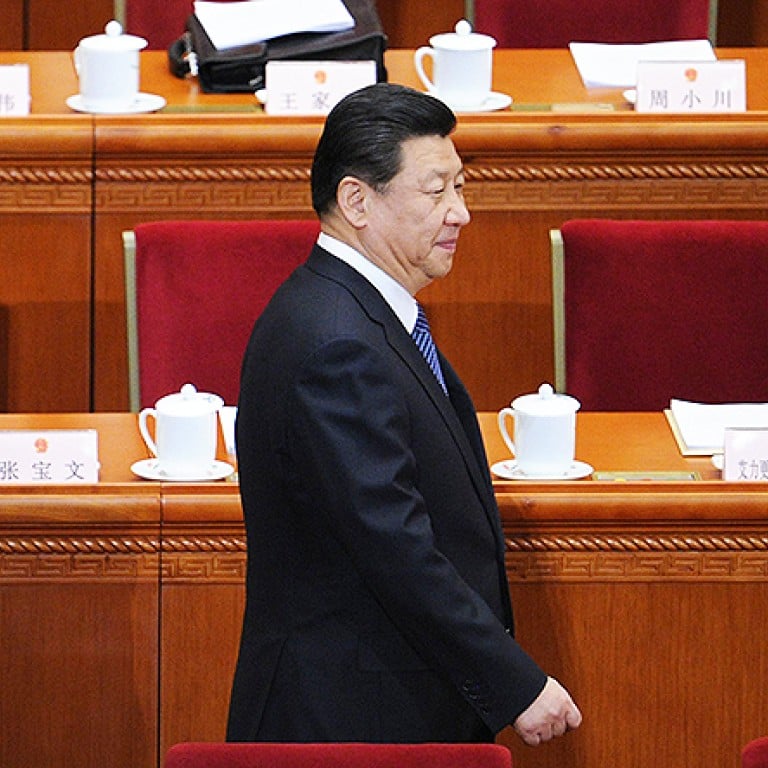
Xi’s crackdown on corruption won’t lead to a more open society
Nora Sausmikat and Chang Ping say political infighting and maintaining stability remain priorities
There is never a total new beginning in political power shifts - no "zero hour". Basic conflict can endure for half a century - like the cleavage between the (conservative faction) and (rebels) from the Cultural Revolution.
When Xi Jinping says today that the princelings are China's "legitimate heirs" of power, he is referring to an argument that was fiercely debated in the immediate aftermath of the Cultural Revolution. The 1980s, and especially 1989, again saw the elite in power divided.
Zhong Weiguang, a former rebel red guard, remembers that, during a marriage ceremony in Beijing in the first half of the 1990s, princelings shouted out: "If we had not had such wise fathers who oppressed the 1989 turmoil, we would have lost our power as early as the socialist governments did in eastern Europe."
Today, the princelings are destroying each other; witness Xi's campaign against "tigers and flies".
Zhou Yongkang - who has been under assault since the start of the year - belonged to a faction associated with Jiang Zemin and Zeng Qinghong while simultaneously, at least according to Hong Kong sources, plotting with Bo Xilai . He was caught in the middle.
When Zhou entered the inner circle of power following the 2003 National People's Congress, he was closely linked to Zeng, who was then vice-president and for a long time the second most powerful person in China behind Jiang. A typical princeling, Zeng was also head of the Organisation Department and president of the party school.
During the struggle over China's entry into the World Trade Organisation, Zeng was responsible for carrying out an investigation into rural uprisings. He was Jiang's closest ally, helping him to restructure the party into a home for millionaires and other "leading personalities in economy, culture and politics". Some Western commentators misunderstood this as the birth of a real people's party representing the majority.
Zhou entered the powerful Politburo Standing Committee in 2007; Zeng left. Being an "heir" of Zeng's insights into personal archives, and closely linked to the secret police, Zhou must have detailed knowledge of leading politicians' assets. According to Bloomberg, Xi's extended family owns assets amounting to US$376 million.
Meanwhile, activist Xu Zhiyong was sentenced in January to four years in prison after seeking greater transparency surrounding the political elite's assets.
When Xi started his anti-corruption campaign against the tigers and flies, he began by targeting the so-called "Shanghai circle" - former associates of Jiang Zemin. This could have prepared the ground for a new evaluation of Tiananmen - but since most political advocates for the cause had already been pushed aside during the last power shift, there is little hope of it happening.
Unfortunately, Xi's method is like very strong poison - it kills everybody, no matter which faction they are in, but especially those asking questions about the assets of the political elite.
Since his leadership began, Xi has surpassed his predecessors in cracking down on free expression and persecuting dissidents, and this trend is unlikely to change with the downfall of Zhou Yongkang.
Until news about Zhou was officially announced, even the phrase "Kang Shifu" (a brand of ramen noodles used by netizens to refer to Zhou) was unsearchable on Sina Weibo.
Furthermore, just as the regime avoided trying Bo for his more egregious crimes, such as wanton imprisonment, executions and the unlawful confiscation of private property, all in the name of the "crackdown on black", Zhou will not be tried for his excesses in the name of "maintaining stability" that occurred during his tenure as the secretary of the Central Party Political-Legal Committee.
He expanded the power of the police, brought in secret police, monitored the life of average people at will, brutally suppressed mass incidents, arrested a large number of dissidents and even those who just voiced discontent. Under his watch, internal security spending was greater than that on defence, in effect waging a 10-year war against the people.
Yet, he will not be charged or tried for any of these crimes.
What Xi has been trying to do has been described by many as "walking the Bo Xilai line without Bo Xilai".
Likewise, Xi will also be carrying the torch to "maintain stability" that was spearheaded by Zhou and others, and taking it to greater heights.
